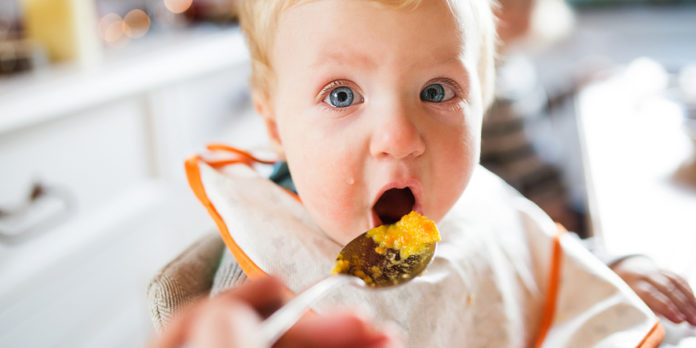Babies starting to eat solids foods go through a learning process and moving from a liquid diet of milk, to purees to lumpy food, can be easy for some babies, but a struggle for others, according to a Deakin University child nutrition expert.
Learning to accept a new food includes sensory elements, such as the look, touch, smell, taste and finally the noise the food makes when a baby chews and this can require a lot of patience and practise.
Many babies begin eating enthusiastically over the early months, however, can then become less willing to try new foods and suddenly start to cry and fuss when being offered food.
This is commonly termed fussy eating and most children go through a stage of fussiness around trying new foods.
Professor Karen Campbell from the Institute for Physical Activity and Nutrition at Deakin University says that this shift in interest around food often reflects the baby’s growing independence.
“Parents want their baby to eat and enjoy a wide range of foods, many of which they’ve taken a lot of time to prepare. Food made with love, cost and time is meant to be enjoyed, not spat out or cried over!
“However, the more you fuss and try to encourage your child to finish what you’ve offered, the more ammunition they have and, in turn, the more they will fuss,” she says.
Some key tips that Professor Campbell says that parents can use from the very start of feeding that will support the development of a ‘good eater’ include:
- Avoid offering ‘back up’ options if your baby rejects the food you’ve offered. Back up are usually foods we know our baby likes and are often sweet. If you offer sweet alternatives to the main offerings, you’ll soon find this becomes a focus for your baby.
- It is quite normal for a child to reject a food 10 or 15 times, so keep offering foods and sit down and enjoy eating those foods with them. If they reject them, try not to make a fuss, because the more you fuss, the more likely they will be to fuss.
- Try not to just go for the easy option of the vegetables your baby may like, but instead offer foods they either haven’t had before or haven’t liked previously. Serving these alongside a food they do enjoy will make them more desirable.
- Encourage your child to smell, touch and with time taste the new food – but keep this encouragement in hand.
- Leave food with your baby for an amount of time that you’re comfy with and then move on.
- Remember that a child can’t learn to enjoy a new food if it’s not on offer. Tastes do change and they can learn to enjoy them.
- Children tend to enjoy the foods you enjoy, so eat with them and model your own enjoyment of the foods you want them to enjoy.
- Children’s appetites change, mostly in response to how much they’re growing. This means that some days they will eat a lot, and other days not as much. Try to be relaxed about feeding and resist encouraging or pushing your child to eat as this overrides their innate ability to know when they’ve had enough.
- Offer and offer again. We know that most children are likely to reject a new food and is probably a biologically driven protective reaction to new, potentially dangerous things in their environment. Rejecting food once or even ten times does not necessarily mean your child doesn’t like the food or that with the eleventh offering won’t begin to enjoy it.
- This fear of the new diminishes as you offer the food again and again, and most children will learn to enjoy most foods if they are repeatedly offered to them. A food previously rejected is often eaten with delight after the fifth or fiftieth messy offering.
For a small group of children, food refusal is persistent and can become highly restrictive in nature, such as child who will only eat white foods, such as white bread, potatoes, and plain rice.
“It’s important to remember that some fussiness will not automatically subside as a child ages and professional assistance may be required from a paediatric dietitian, psychologist or feeding clinic,” Professor Campbell said.
“This extreme fussy eating may be due to an underlying physical or neurological issue which may need to be addressed by a professional, as over time food fussiness can get worse as the negative association attached with meal times and with food increases.”
Professor Campbell and colleagues from IPAN have developed a free online course called ‘Infant Nutrition: From Breastfeeding to Baby’s First Solids’. This course has already been accessed by more than 11,000 people from around the world.
(Source: Deakin University)




 (3 votes, average: 3.67 out of 5)
(3 votes, average: 3.67 out of 5) 






